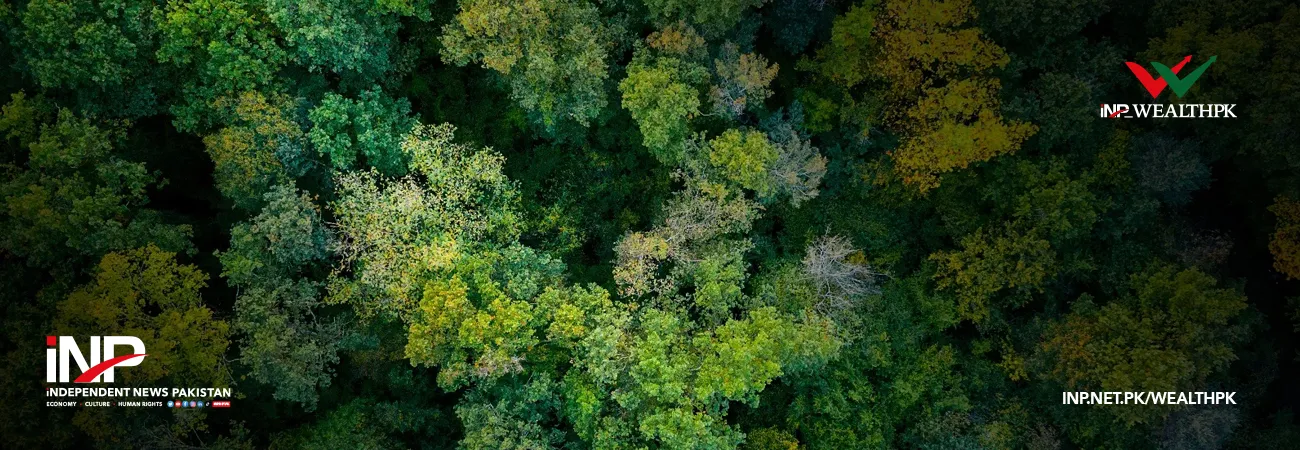INP-WealthPk
Faiza Tehseen
Integration of urban ecosystem (UE) services into city planning can help cope with the climate change and socioeconomic impacts caused by rapid urbanization, said Deputy Director Pakistan Forest Institute (PFI), Peshawar Muhammad Aatif while talking to WealthPK. "Generally, an urban ecosystem (UE) is a composition of both natural and artificial elements impacting the environment, socioeconomic factors, and human activities. UE can be compiled into different ecosystems including lakes, wetlands, urban forests, and urban parks. The urban ecosystem functions in cities and is described as urban ecosystem services. It has the potential to improve the environment, human health, and urban biodiversity," he explained. Right plantation and plant diversity largely help in conserving water, creating a habitat for urban wildlife, and maintaining the natural eco-cycles. Through plant diversity, useful insects also get a habitat. Urban development mostly disturbs the natural healthy ecosystem cycles.
Responsible planning and management of urban ecosystems can positively assist the cycling of energy, water, air, and nutrients. Aatif said, "Urbanization is increasing the need for ecosystem services to mitigate significant challenges, especially the assurance of a healthy and safe environment. An ecosystem service is any positive benefit that is provided to the people through wildlife or ecosystems. Urban ecosystem management includes conservation, preservation, and recovery of habitat remnants. It also includes the restoration process of natural cycles – the water cycle. The urban ecosystem services are divided into four categories – supporting, provisioning, regulating, and cultural bonding." He said Supporting Ecosystem Services (SECs) address all necessities, crucial for production of all other ecosystem services. SECs mainly include biomass and atmospheric oxygen production; water and nutrient cycling; and soil formation and retention.
Provisioning services supply necessary materials to different ecosystems, such as food, water, fibre, and many others. With the growth of urban areas, the space for provision of services is decreasing. Urban gardens/parks are a good example of this. Increasing the area of urban gardens can not only improve the supply of provisions and food but also improve the environment. The Peshawar Forest Institute deputy director further said, "Regulating services are the benefits acquired from regulating environmental conditions, including aquatic purification and climate regulations. For human health and environmental safety, Regulating Ecosystem Services (RES) is important. Cultural ecosystem services address the intangible benefits impacting human lives through different socioeconomic behaviours. The need for space, quality of life, food security, health, quality air, less climatic impacts, facilities, and services is increasing with the rapid growth of urbanization.
So, proper planning and management for an urban ecosystem is necessary to frame". Discussing with WealthPK the importance of planning and managing the urban ecosystem services required in Pakistan for socioeconomic benefits and environmental safety, social and rural development expert and environmentalist Saleh Mangrio said, "In Pakistan, integration of ecosystem services emerges as a pivotal strategy for fostering socioeconomic progress and environmental sustainability. This approach is crucially applicable to both rural and urban settings, offering a holistic pathway to enhance livelihoods, promote health, and safeguard natural resources". He said in the urban context, the need for well-managed ecosystem services is equally pressing. Green infrastructure, such as parks, green roofs, and urban wetlands, plays a crucial role in improving the air quality, managing stormwater, and providing recreational spaces for the city dwellers.
The socioeconomic benefits of integrating ecosystem services into rural and urban development are manifold. In urban areas, green spaces and improved environmental quality can reduce healthcare costs, increase property values, and attract tourism and investment. He said, "Policymakers, development practitioners, and communities must embrace the management of ecosystem services as a cornerstone of sustainable development. By recognizing the intrinsic value of our natural resources and integrating them into our development agendas, we can pave the way for a prosperous and resilient future for the coming generations. As Pakistan continues to strive for socioeconomic development, let us not forget that our natural environment is our greatest ally in benefiting current and future generations".
Credit: INP-WealthPk













